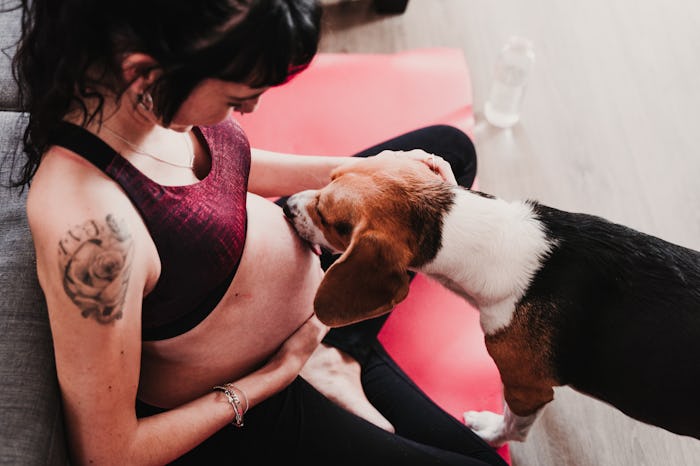Life

Here's Why Your Dog Is So Clingy & Cuddly As You Get Closer To Your Due Date
Moms of both human and fur babies may have noticed that while their bun was in the oven, their pup was a bit clingier than before. Turns out there’s a reason your dog is cuddlier around your due date, and even throughout your entire pregnancy. They can smell change in the air, and see your body and behavior changing, too.
The American Kennel Club reports that many canine experts believe dogs can sense the change in a woman’s hormones once she becomes pregnant. Those same nose superpowers that help them sniff out bombs also help them analyze their owners’ scents, so not much gets by them, including pregnancy.
“We don't really know what a dog knows since they can't tell us, but we accept that the change in behavior is because they are sensing a change,” says Robert Cabral, canine behavior specialist at Wag!, in an interview with Romper. “Dogs can sense even the slightest change in smell, and when a woman is pregnant there is a shift in hormones. This increase in hormone production is often noticed by a dog's keen sense of smell. The dog's sense of smell is 40 to 50 times more powerful than ours. Essentially, a dog can smell better than we can see.”
M. Leanne Lilly, assistant professor at The Ohio State University College of Veterinary Medicine, tells Romper in an interview that while dogs can sense changes in their mom’s smell, it’s unlikely they know a baby is on the way.
“Given the large amount of physiologic changes that go on during pregnancy and the sensitivity of the canine nose, it makes sense that dogs can smell that something is different. Whether or not dogs know that something leads to an infant later existing is unlikely, at least for a first pregnancy that the dog’s been through. Whether or not they can learn that is up for debate, and due to the time lag between the starts of changes and an infant coming home, would also be challenging to evaluate,” says Lilly.
Not all dogs are comfortable with change, either. While your new smell may make your dog come closer for comfort, it may set others on edge.
“While some dogs get more snuggly with the change in smell, some seem to get more worried,” Lilly explains. “There are also certainly pets who don’t seem to change — that the clients are aware of — or those who are even more standoffish. But the stories about a dog getting ‘snugglier’ are cuter and tend to stick with us.”
Even if your dog is totally nose blind and never changed its behavior throughout your pregnancy, they may still cozy up to you as you near your due date. However, this may just be because you’re on the couch a little more frequently, and your pup is here for it.
“My theory is, as a woman is becoming more maternal, the dog picks up on this and feels the energy and sort of takes advantage,” says Cabral. “Cuddle time and resting when the human mom is feeling cozy is a nice feeling that makes the dog feel nurtured.”
With change literally in the air for your fur baby, how can you make sure they feel calm and comfortable? Cabral suggests scheduling walks and feedings that will work when baby arrives to get into a routine.
“It's important that the dog maintain consistency,” he says. “Dogs find safety in structure. If the dog has had good basic obedience training, it will be important to maintain that, and if they haven't, a good ritual of structure will help. Before the baby arrives, be sure to have prepared the dog with plenty of routines that will carry over. For everyone's safety, I don't recommend letting the dog play with or lick the baby for quite some time. A dog's playfulness can be dangerous to a baby.”
Lilly adds that you can’t make your dog’s anxiety worse, but you can make it better. Not only does providing some extra lovin’ go a long way, but getting them used to new things, like baby furniture, can help them get more comfortable before you bring home a bundle of joy.
“Change can be hard for many dogs,” she says. “If your dog feels better with the changes going on by being given a food item or some extra pets, then that’s great, go ahead and comfort them. If those things don’t help your dog feel more comfortable, don’t continue to do them in those contexts, and consider other options. Incremental introduction to some of the changes in the household may help as you prepare for your baby. Furniture, items, new behaviors like carrying a person, can all be broken down into small steps — and work at the dog’s pace to pair those things with food or play so that they’re not strange or frightening. If your dog is too worried to do either of those things, then seeking help from your veterinarian or a veterinary behaviorist is helpful — there are a wide range of scientifically studied behavior support options ranging from pheromones and probiotics to medications.”
Experts:
M. Leanne Lilly, DVM, DACVB, The Ohio State University College of Veterinary Medicine
Robert Cabral, canine behavior specialist at Wag!